SDG Summer School 2021: Students’ Open Source Health Solutions Facilitated by Chaihuo Maker Space, Geneva Tsinghua Initiative, UNITAR, and Others
By Ye Seong SHIN 3 years agoIn an effort to encourage high school and university students to address SDGs in practical and rapid manners, “SDG Summer School 2021: Open Source Health Solutions” was organized in July in Switzerland (Geneva), France (Paris), South Korea (Seoul), China (Shenzhen), Singapore, and Chile. This was organized by Geneva Tsinghua Initiative (GTI) and supported by its manifold partners, including Chaihuo Maker Space and United Nations Institute for Training and Research (UNITAR). As a result, participants came up with open source hardware and software solutions to tackle health-related challenges. This hands-on educational program seeks to achieve the UN’s SDGs 3, 4, 5, 12, 9, 10 and 17.
Event Name: SDG Summer School 2021
Event Location: Switzerland, France, South Korea, China, Singapore, Chile
Targeted Industry Type: Health
Event Partner(s):
In 2015, all the Member States of the UN committed to 17 Sustainable Development Goals (commonly known as the “SDGs” or “Global Goals”). This was the universal call of action for making a sustainable future for all, through delivering peace and prosperity by 2030. The 17 SDGs are focused on the most pertinent issues of concern for all the countries, mainly revolving around social, economic, and environmental dimensions (Figure 1). Within each of the SDGs, there are more specific goals for better scoping and contextualization – namely, “Targets” – and there are 169 Targets in total. (UN, 2015).
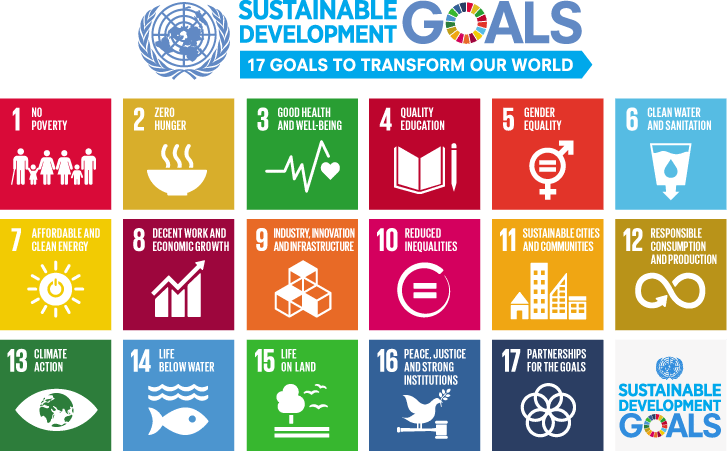
Figure 1. The UN’s 17 SDGs (UN, n.d.)
The SDGs and their Targets are interconnected in nature, which is why achieving one or two SDGs might positively, negatively, or neutrally affect the other SDGs, either in direct or indirect manners. Thereby, holistic project management on SDGs based on multi-disciplinary and multi-stakeholder approaches became all the more necessitated. As a result, unexpected and negative externalities can be prevented or reduced. Indeed, with the motto of “Leave No One Behind”, SDGs can only be fully accomplished by leveraging various resources and networks of multi-stakeholders from local communities, governments, public organizations, private sector, academia, civil society organizations (CSOs), UN agencies, and more.
On this backdrop, Geneva Tsinghua Initiative (GTI) is an academic partnership between the University of Geneva in Switzerland and Tsinghua University in China since 2017. Through this partnership, GTI brings together all types of interesting resources from the two universities – Geneva as the hub of international organizations, Beijing and Shenzhen as the advanced-technology portal with an agile tech manufacturing ecosystem – in order to facilitate students’ holistic and hands-on learning to achieve the UN’s SDGs. In fact, in January 2017, President Xi Jinping of China and Former President Doris Leuthard of the Swiss Confederation, jointly witnessed the signing of the memorandum between University of Geneva and Tsinghua University (Figure 2), that aims to:
- Raise potential SDG champions and contributors to solve socioeconomic and environmental challenges in real life
- Provide multicultural immersiveness in “International Geneva” and “Entrepreneurial China” to stimulate outside-the-box thinking through innovative, hands-on, practical, and challenge-based learning
- Enhance multi-disciplinary projects by harnessing various teaching tools and perspectives in solving challenges
- Prepare the students with adaptive capacity and critical thinking skills in this digitally, unpredictably, and rapidly transforming era
- Upgrade the multi-stakeholder partnerships among academia, international organizations, companies, and CSOs. (GTI, n.d.).
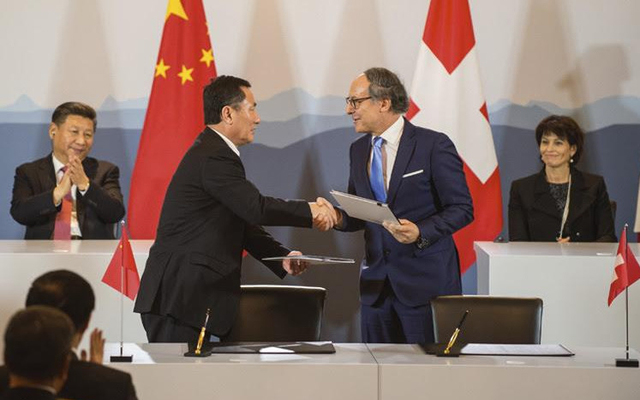
Figure 2. Signing of the Memorandum of GTI Between
University of Geneva and Tsinghua University in 2017 (GTI, n.d.)
What’s the Challenge?
How can young people be encouraged to accelerate the progress of achieving the SDGs?
What’s the Event About?
In order to encourage high school and university students to address SDGs in practical and rapid manners, “SDG Summer School 2021: Open Source Health Solutions” was organized during 5th-30th of July this year in Switzerland (Geneva), France (Paris), South Korea (Seoul), China (Shenzhen), Singapore, and Chile (Figure 3). This educational program was run in combination of online and offline activities organized by GTI and supported by its manifold partners, including Chaihuo Maker Space of Seeed Studio, Citizen Cyberlab, Open FIESTA, CRI, University of Geneva, University of Paris, Yonsei University, Tsinghua University, HackaHealth, Institute of Global Health at the Faculty of Medicine of the University of Geneva, Global Green Economic Forum, and United Nations Institute for Training and Research (UNITAR).
At the SDG Summer School 2021, participants were inspired to tackle health-related challenges with open source hardware and software solutions. All the participating teams were from multi-disciplinary backgrounds, and were centrally guided by GTI professors and staff members at SDG Solution Space (the backbone of SDG Summer School in Geneva) through online seminars and meetings, while receiving local mentorship and on-site prototyping resources from the partner universities and organizations. This year, students were encouraged to conceive various ways of using open data, crowdsourcing technologies, and low-cost open tech tools that can bring impactful and positive effects for sustainable development at local, regional, national, and global levels.

Figure 3. SDG Summer School 2021 (GTI, 2021)
SDG Summer School has been annually organized by GTI with its trans-sectoral partners from universities, UN agencies, companies, CSOs, governments, and associations to raise university students as bottom-up and citizen innovators in the global community. It is an educational program focused on solving the SDGs through ideating, planning, developing, implementing, and evaluating team-based innovation prototypes.
This year’s SDG Summer School commenced with a 3-day bootcamp on topics of health, aging and disabilities, in order to prepare the participants with relevant knowledge and skills needed for project development. Afterwards, participants were divided into smaller teams to upgrade last year’s projects on Open Source Health Solutions regarding 9 Challenges, including assistive technology for people with visual loss or difficulties to navigate urban streets, and mapping human-animal interactions to prevent future pandemics.
From Chaihuo Maker Space side, 8 students from different cities participated in SDG Summer School 2021 as 2 teams. On 5th of July, the opening ceremony of SDG Summer School 2021 commenced on-site in Geneva by GTI, and was held simultaneously online at Chaihuo Maker Space (Figures 4 & 5), France, South Korea, Singapore, and Chile. At Chaihuo, they got familiarized with, and mastered various digital manufacturing tools, open-source technology, as well as received active professional support in beginning and completing their prototypes. On Fridays, all the participating teams from all over the world gave their project pitches online. Through the iterative project pitch sessions, the team members were able to improve their projects based on other teams’ feedback and suggestions from various perspectives, as well as to upgrade their pitch-giving skills.
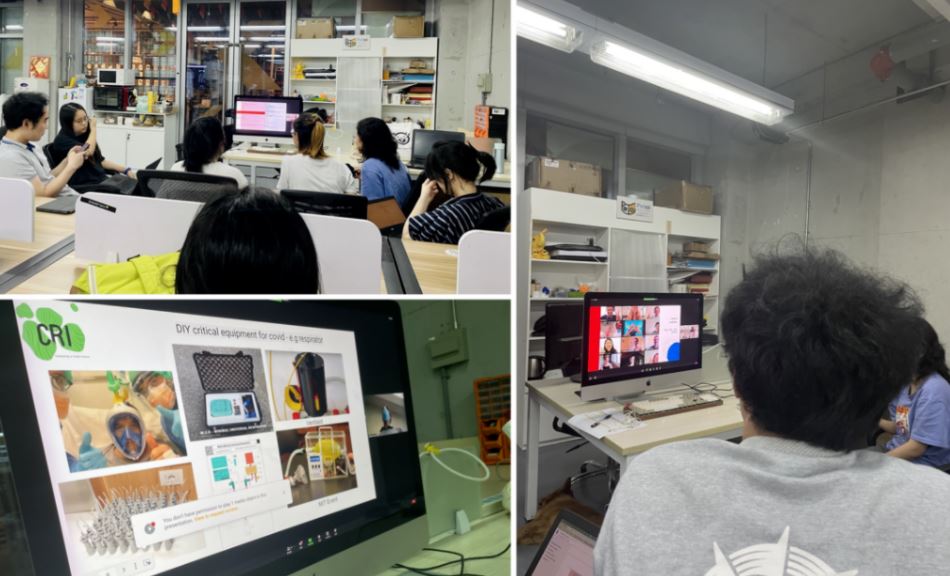
Figure 4. Students Participating in Online Opening Ceremony of SDG Summer School 2021 at Chaihuo Maker Space
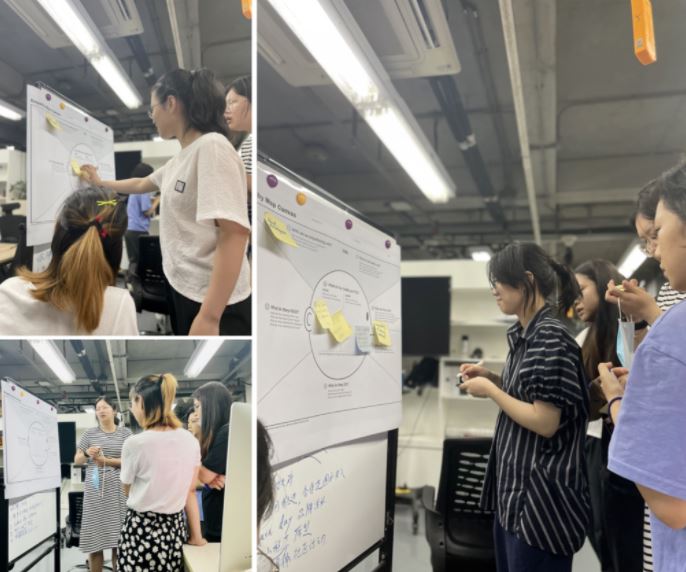
Figure 5. Students Working on Their Projects Through Hands-On Teamwork at Chaihuo Maker Space
What Are the Event Outcomes?
On 16th of July, the students learned about the development of the open source community, maker culture, and application cases of open source hardware in various industry scenarios. Later, from the perspective of software and hardware, they learned about the underlying principles of open source hardware and the method of using code control modules to implement specific functions based on the Arduino starter kit provided with the course (Figure 6).
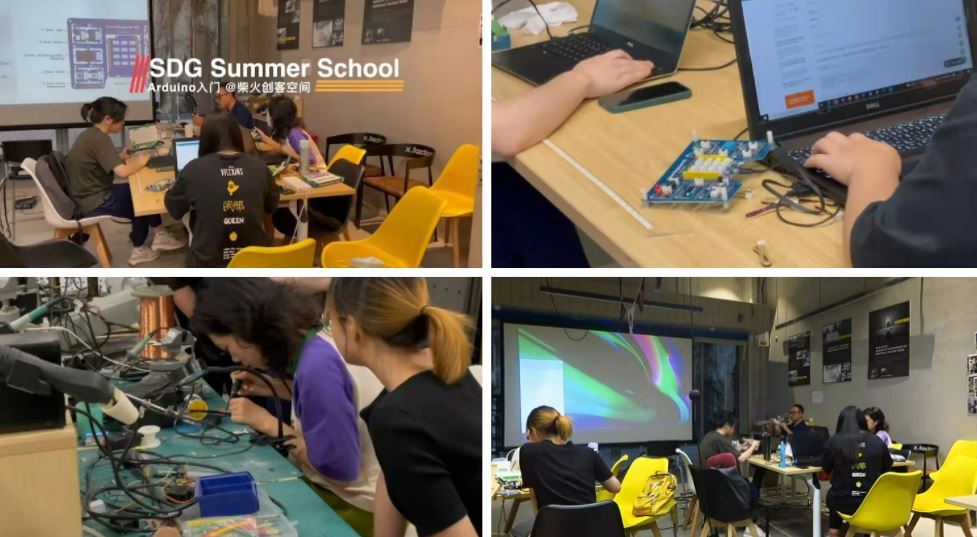
Figure 6. Students Learning Open Hardware and Open Tech Tools at Chaihuo Maker Space and Its Fab Lab
On 26th of July, for all the participants of SDG Summer School 2021, Mr. Eric Pan – the founder and CEO of Chaihuo Maker Space and Seeed Studio – was invited to deliver a speech on how open tech enables digital transformation of traditional industries to solve challenges related to SDGs, through sharing hands-on maker community projects and successful cases (Figure 7).
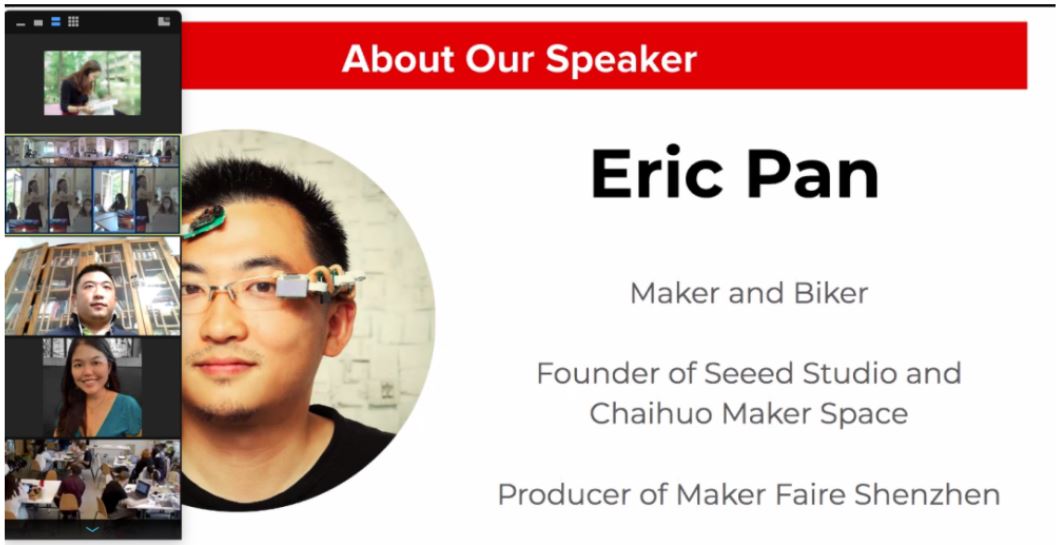
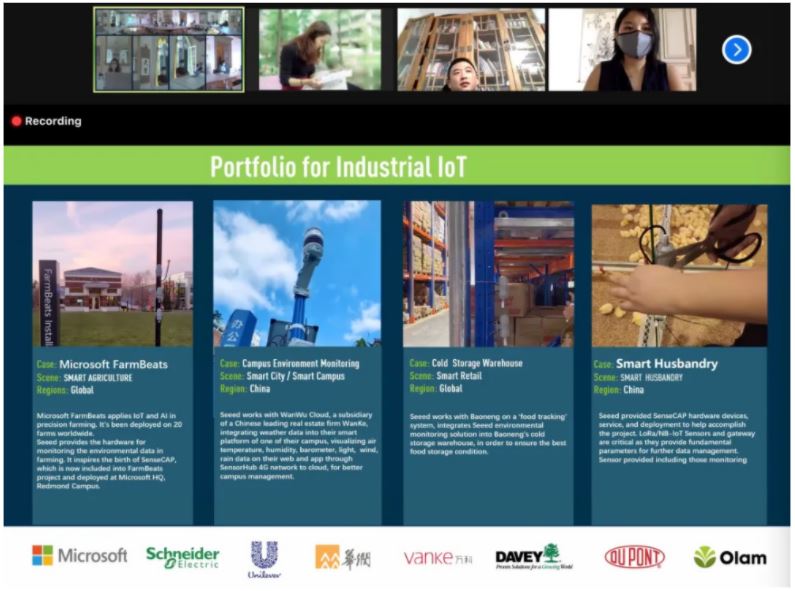
Figure 7. Mr. Eric Pan Speaking at SDG Summer School 2021
As a result of this SDG Summer School 2021, the 2 teams from Chaihuo Maker Space have developed project proposals on: i) Challenge 2: early-stage cervical cancer detection by open software, and; ii) Challenge 7: mapping human-animal interactions to prevent the next pandemic by open software. They described their experience of SDG Summer School 2021 at Chaihuo Maker Space as the following:
“I am very happy to visit Shenzhen to participate in the SDG Summer School 2021, and meet students from different places. Chaihuo Maker Space has given a lot of help in our project. Under the leadership of the instructor, I learned about open source hardware, which inspired my interest in open source hardware.”
“I spent an unforgettable month in Shenzhen, and met a group of very powerful friends from different fields, brainstorming together, staying up late to catch up together. It was very meaningful. Then, thank you, Chaihuo Maker Space, for providing us with a spacious venue. At the same time, the training of open source hardware was very interesting!”
For other teams from other countries, they came up with project proposals and/or prototypes on Challenge 1 (open hardware device to assist people with vision loss or vision difficulties), Challenge 4 (free access to environmentally-sound menstrual health products), Challenge 7 (human-animal interactions to prevent future pandemics), Challenge 8 (information package on non-communicable diseases for WHO’s existing open-source app), and Challenge 9 (inclusive playtime for children with physical health issues). As for the prize of SDG Summer School 2021, winning teams were given the chance to apply for GTI’s SDG Accelerator to further develop and scale-up their projects. Furthermore, all the participants have received 6 ECTS for completing the SDG Summer School 2021. (GTI, 2021).
Which SDGs Are Relevant?
Through the SDG Summer School 2021, it seeks to contribute to the following SDGs (Figure 8):
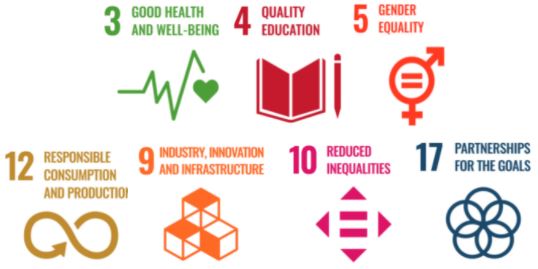
Figure 8. Specific SDGs Closely Connected with SDG Summer School 2021 (UN, 2016)
To build a deeper understanding on why these SDGs are important for SDG Summer School 2021, we need to pay attention to the SDGs’ Targets:
- Eliminate the epidemics of AIDS, tuberculosis, malaria, hepatitis, tropical diseases, and other communicable and non-communicable diseases through prevention, treatment, promotion of mental health, as well as by signalling early warning, risk reduction and management of national and global health risks in timely manner (Targets 3.3, 3.4 & 3.D)
- Get rid of educational gaps by providing equal access to all levels of education and vocational training for underserved population groups, including people with physical health difficulties, and children in vulnerable situations (Target 4.5)
- Facilitate that all learners obtain the knowledge and skills needed to promote sustainable development, including, education for sustainable development, gender equality, a culture of peace and non-violence, global citizenship, and appreciation of cultural diversity (Target 4.7)
- Upgrade the usage of enabling technologies to facilitate self-empowerment of women (Target 5.B)
- Enhance people’s awareness and knowledge on sustainable development and lifestyles to live in harmony with the environment (Target 12.8)
- Upgrade scientific R&D, technological capabilities, innovative capacity of industrial sectors (Targets 9.5 & 9.B)
- Promote social, economic and political inclusion of all, regardless of age, sex, disability, race, ethnicity, origin, religion or economic status (Target 10.2)
- Promote North-South, South-South and triangular regional and international cooperation on and access to science, technology and innovation (Targets 17.6 & 17.9)
- Upgrade the global partnership for sustainable development through multi-stakeholder partnerships – effective public, public-private and civil society partnerships – to share and mobilize knowledge, expertise, technology and financial resources (Targets 17.16 & 17.17)
As a member of the global maker community, Chaihuo Maker Space has been paying attention to on-field practices and possibilities of combining open technologies for SDGs in the past 10 years of our community operations. Through all these years, we witnessed more and more innovators and makers in the community are using their individual capacities, skills, and resources to leverage open source technology and community collaboration to promote the implementation of the SDGs. As Victor Hugo (a renowned French poet and novelist) describes in his credited phrase, “Nothing is more powerful than an idea whose time has come.”, SDGs are surely the “idea” of this era. Connect with Chaihuo Maker Space and Seeed today to realize the idea of this era: NOW. 
About Author
Ye Seong SHIN
Sustainability and CSR Manager at Seeed Studio
。
Jointly organize/participate in multi-stakeholder projects/platforms/events/webinars/workshops/hackathons/etc. to accelerate SDGs with local communities and open tech anywhere in the world by connecting with Ye Seong SHIN today on LinkedIn.
。
Seeed Studio is the IoT and AI solution provider for all types of traditional industries’ sustainable digitalization. Since its establishment in 2008, Seeed Studio’s technological products and customization services are used for smart agriculture, smart cities, smart environmental monitoring, smart animal farming, smart aquaculture, meteorological monitoring, STEAM education, and all types of emerging scenarios enabled by the Industry 4.0. With the company’s mission to “Empower Everyone to Achieve Their Digital Transformation Goals” (which shares similar values with SDGs’ Motto of “Leave No One Behind”), Seeed Studio is devoted to using open source technologies for accelerating SDGs with multi-stakeholders from UN agencies, academia, companies, CSOs, governments, public/private organizations, and so on. This is why, Seeed Studio also founded “Chaihuo Maker Space”, and started China’s first Maker Movement by annually organizing “Maker Faire Shenzhen”.
